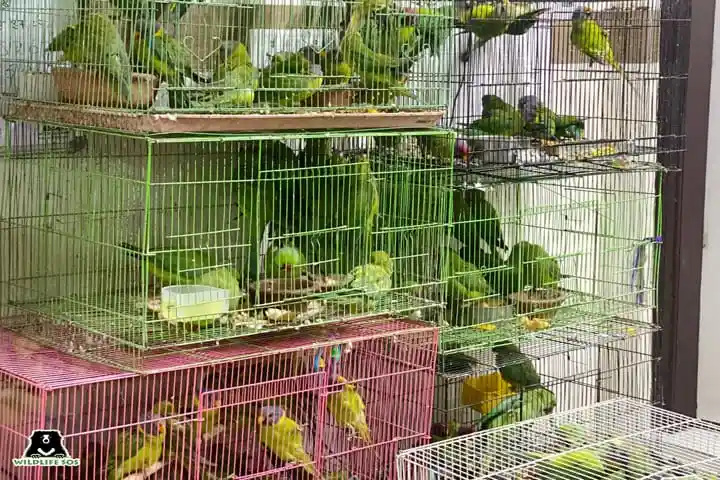A large-scale illegal trade of protected birds was detected by the Delhi Police in the Capital with more than 1,700 native birds seized in a raid on Wednesday. The birds were found crammed in suffocating cages in Jama Masjid’s Kabutar Market.
The Delhi Police along with the Forest Department seized the birds which included adults, juveniles, and over 500 chicks. At present they have been placed under Wildlife SOS for care and medical treatment. The rescued birds included adult and baby parakeets (Indian parrots) – Alexandrine, Rose-ringed, and Plum-headed parakeets – besides munias numbering hundreds, two hill mynas, and buntings.
A number of these bird species are not found in NCR and have been smuggled from different States. Of the 12 native species of parakeets, the Rose-ringed, Alexandrine and Plum-headed parakeets are three of the most traded birds in the country. Parakeet chicks who are three to four weeks old are captured and illegally traded across India. A number of these die due to the stressful conditions.

Parakeet chicks
The birds were kept in unhygienic conditions, crammed in small cages and in rooms with no ventilation. The baby parakeets were stacked on top of each other in tiny cardboard boxes while many of them were found dead.
The raid was conducted based on a complaint filed by PETA India. While the Hill mynas are protected under Schedule I, the parakeets and munias fall under Sched-ule IV of the WPA.
The Forest Department took custody of the birds, and as per the direction of the Deputy Conservator of Forests, the rescued birds, including adults, chicks and juveniles, have been placed under the care of Wildlife SOS.
Sharing details of the raid, Aditya Madanpotra, the Deputy Conservator of Forests (Central division) said: “We took possession of the birds from the Delhi Police. As they are under extreme stress and many of them are barely a few weeks old, they have been handed over to Wildlife SOS for care, feeding, and medical treatment. This is perhaps one of the biggest seizures of this kind in Delhi.”

Hill myna
Applauding the raid, Wasim Akram, Deputy Director (Special Projects), Wildlife SOS remarked: “Many (of the birds) are sick, dehydrated, malnourished, and under immense stress. Some are also suffering from eye infections, wing damage, and other injuries. It was shocking to discover that the munias have been dyed in bright colours using harmful chemicals.”
Wildlife SOS Secretary, Geeta Seshamani said: “The baby birds are very small and vulnerable, requiring extensive care and feeding every 3 to 4 hours. They will be released in their natural habitat once they are fit by veterinary experts.”
Also read: Two leopard cubs reunited with mother in Maharashtra's Nirgude village




















